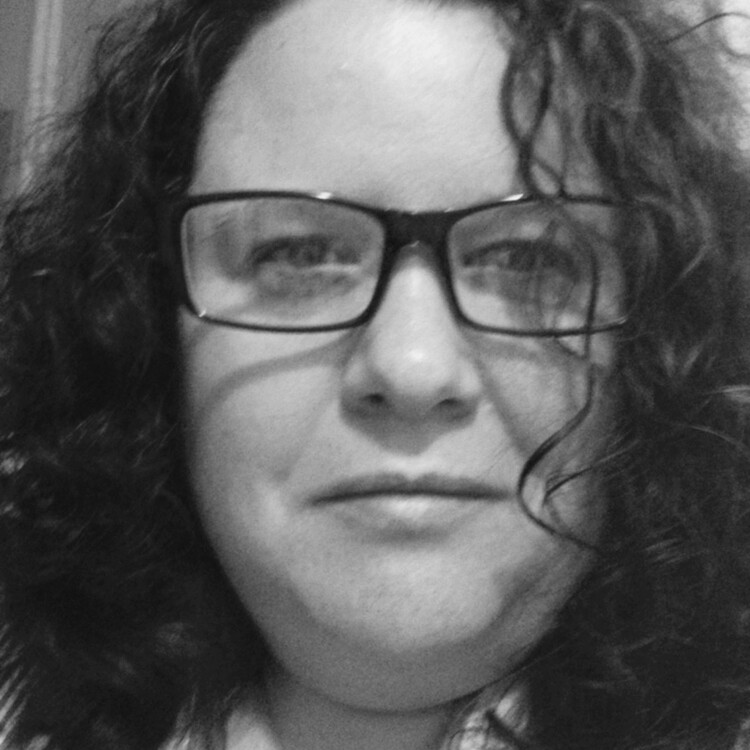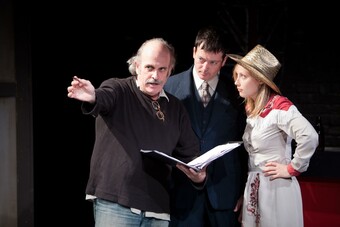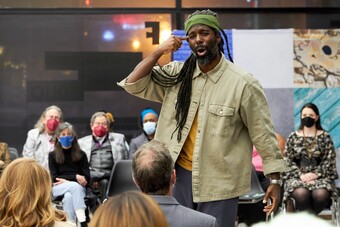International Collaboration in TYA New Play Development
New Visions/New Voices (NV/NV) is a biennial play development series of the Kennedy Center. Co-founded by Deirdre Kelly Lavrakas and Kim Peter Kovac, NV/NV celebrated its twenty-fifth anniversary with its 2016 festival, which included the release of a two-volume anthology from Dramatic Publishing, New Visions/New Voices: 25 Years 25 Plays. Since its beginnings, Lavrakas and Kovac have looked at how the festival can both enhance the field of theatre for young audiences (TYA) and promote inclusivity within it.
Perhaps one of the most interesting areas Lavrakas and Kovac have been moving towards is international collaborations. This began in 2006 with two international companies, Unicorn Theatre and Windmill Theatre Company. Every festival since then has included at least one international company, including the Translation Project in 2012 and 2014. In addition to international scripts, a new perspective began in 2010 with the presence of International Playwright Observers (IPOs), who observed the process and shared snippets of their work with interested participants during the 2010, 2012, and 2014 conferences. Then in 2011, Lavrakas and Kovac started the website, Write Local Play Global with Tony Mack (of Australia) to connect playwrights and theatre professionals from around the world.
While the International Playwright Observer program was useful for expanding international awareness of theatre for young audiences (TYA), Lavrakas and Kovac felt the process encouraged a more inward gaze than outward. They also saw a need for young theatre professionals to better understand the workings of TYA new play development. Thus, they proposed a bold new international innovation for the 2016 festival, the International Playwrights’ Intensive (IPI), which replaced the IPOs. The process of planning this new initiative began in the spring of 2014 with invaluable assistance provided by Young Ai Cho from Korea, Dr. Ashish Ghosh of India, and Yvette Hardie, President of ASSITEJ from South Africa. Then in February 2015, Lavrakas met playwrights in South Africa, Korea, and India.
With assistance in playwright recruitment from three international collaborators and program support led by Scot Reese and Faedra Chatard Carpenter at the University of Maryland’s School of Theatre, Dance, and Performance Studies (UMD), the 2016 IPI featured nine playwrights– five from South Africa (Lereko Mfono, Koleka Putuma, Samson M. Mlambo, Tamara Schulz, and Jon Keevy), three from India (Sunil Bannur, Deepika Arwind, and Vinati Makijany), and one from Korea (Choon-Keun Park).
Unlike previous international collaborations, the IPI playwrights were not merely observers who watched the process and provided snippets of their plays to festival attendees. Rather, they experienced a week of development with UMD students followed by a week of development with professional Washington DC-based actors. Following each week, readings from each play were presented to UMD and festival audiences.
Week One: Cultural Immersion
In the week prior to the playwrights’ arrival, Lavrakas and Kovac spent three evenings at UMD in a cultural immersion session with the artists, faculty, and students who participated as actors, dramaturgs, directors, assistant directors, designers, and stage managers. Getting to know the countries from which the playwrights hailed was another goal as the dramaturgs presented information about each country. UMD also provided cultural ambassadors, people who were from the three countries and provided additional depth.
Week Two: Development at UMD
Following the international playwrights’ arrival, there was a read-through of all nine scripts and a pizza party on Sunday, April 24. During the rest of the week, the playwrights spent their days writing and consulting with members of their artistic team. The playwrights were also invited to attend classes.
A unique component of the IPI was the addition of sensory dramaturgy. The sensory dramaturgs were student designers who created a visual tapestry of script impressions from which the playwright could perceive his or her script from a visual perspective. This is similar to how designers at the O’Neill Theater Center’s National Playwrights Conference prepare set designs to offer playwrights a visual translation of their script.
During the three evenings of rehearsals, playwrights developed their scripts with UMD actors. Because the actors were cast in at least two readings, the rehearsals were divided into two sections—6 to 8 pm for one reading and 8 to 10 pm for the second reading. Each night started with a full group warm-up.
The UMD residency culminated with all nine scripts having one rehearsed reading in UMD’s Kogod Theatre. All nine scripts offered an interesting perspective on the world of each playwright, and the collective realization that even in our differences we are alike, a recurring theme over the course of the IPI.
Week Three: Kennedy Center
On the second Sunday, the playwrights transitioned to a residency in Washington, DC. This third week of IPI began with tea. Joining the international playwrights and NV/NV staff members were the playwrights, directors, and dramaturgs of the six US-based scripts. During this week, the international playwrights spent part of their day writing and rehearsing as well as observing and exploring DC. Unlike the academic setting in Maryland, their process occurred in a professional theatre with DC-based actors.
The culmination of IPI was during the conference portion of NV/NV when twenty-minute excerpts of each script were presented on the Family Theatre stage. Like their time at UMD, the guest playwrights engaged informally with the audience following each reading.
In today’s divisive world where differences are far too often maligned than celebrated, it’s important to avoid the trap of developing a single story that distorts, disrupts, and destroys our humanity.
Celebrating TYA and New Play Development through International Collaboration
Though I wondered if cultural misunderstandings would create bumps along the way, it was not the case. Whether it is the nature of theatre, or an uncanny collection of personalities open to, and/or experienced with negotiating culture, the lament I heard was a wish for more time—more time to rehearse, more time to meet outside of rehearsals to both foster cultural exchange and share experiences and advice, and more time to share the work.
The playwrights not only provided support, but also learned from each other while soaking up the academic and professional theatre settings at their fingertips. Even though it was nearing the end of the academic year at UMD, the faculty and students were unfailingly gracious and generous as well as enthusiastic and genuinely interested in supporting and learning from the IPI playwrights and NV/NV staff. Then at the Kennedy Center, the NV/NV staff was equally compassionate, supportive, patient, enthusiastic, and eager to provide the playwrights and UMD folks with whatever they needed to have a successful experience. The playwrights and creative team members ultimately reported immense satisfaction with the process. They felt they made connections with people from around the world, received support, developed a stronger sense of writing, and were moved by each other’s stories.
In her 2009 TEDGlobal speech, “The Danger of a Single Story,” Nigerian-born novelist Chimamanda Ngochi Adichie reminds us how easy it is to misunderstand another person or culture. Programs such as the IPI not only provide opportunities to build bridges and support the development of new TYA scripts, but also help us develop multiple stories about other places and other people. As one UMD student observed, “Theatre can be magic to get rid of borders or walls.” In today’s divisive world where differences are far too often maligned than celebrated, it’s important to avoid the trap of developing a single story that distorts, disrupts, and destroys our humanity. Perhaps the greatest legacy of international collaborations such as the IPI is to help us see the universality in each of our stories.











Comments
The article is just the start of the conversation—we want to know what you think about this subject, too! HowlRound is a space for knowledge-sharing, and we welcome spirited, thoughtful, and on-topic dialogue. Find our full comments policy here